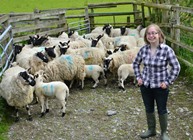History of native Welsh sheep breeds uncovered

Sarah Beynon IBERS PhD student with Beulah sheep
22 June 2015
The genetic integrity of native Welsh sheep breeds combined with contemporary scientific techniques will develop the commercial flocks of the future.
Sheep farming is one of the most important areas of Welsh agriculture, contributing around £230 million to the overall UK economy annually, and native Welsh sheep breeds are an invaluable and unique genetic resource for future breeding and conservation programmes.
This is the main conclusion of a paper published by BMC Genetics this week by Aberystwyth University’s IBERS PhD student Sarah Beynon, Dr Gancho Slavov and Dr Denis Larkin formerly at IBERS now at the Royal Veterinary College in London.
The three year research project, sponsored under the Knowledge Economy and Skills Scholarship programme and by Hybu Cig Cymru, has mapped the genetic history of 18 native breeds of Welsh sheep and identified four genetically different subpopulations, with most mountain breeds forming a distinct, relatively similar group.
IBERS PhD researcher, Sarah Beynon, who performed the research said: “These findings provide the basis for future genome-wide association studies and a first step towards developing genomics assisted breeding strategies in the UK.”
Dr Denis Larkin, Reader in Comparative Genomics at the RVC, who led the research said: “The genetic integrity of these native breeds and the contemporary scientific techniques of genetic selection offer breeders in Wales the opportunity to develop the commercial flocks that will be comparable to commercial breeds like Texel but better adapted to the local environment.
Many farmers believe that Welsh breeds are native and locally adapted. Our data suggest common ancestry between the native Welsh and various European breeds, but the Welsh breeds are also highly diverse for such a low to moderate population size, forming at least four distinct genetic groups.”
Sheep were domesticated 10,000 years ago, but little was previously known about the history, genetic diversity and relationship between Welsh and other European breeds. Understanding the relationships between breeds within Wales, the UK and the rest of Europe will assist breeding strategies. The aim of these strategies is improved production through lower costs, increased efficiency, improved livestock health and monitoring of inbreeding.
The team analysed genotype data – the genetic differences between the Welsh breeds – and compared this to data collected from sheep breeds worldwide by the International Sheep Genome Consortium HapMap project.
They used 353 individual animals from the 18 native Welsh sheep breeds. The findings showed that Welsh sheep share more similar DNA sequences with several other breeds from across Europe than with breeds from Asia and Africa.
Some breeds, such as the Black Welsh Mountain sheep, saw their genetic history mapped back to Scandinavia, meaning their genetic history is heavily influenced by the sheep brought to Wales by the Vikings. Other breeds, such as the Llandovery White Face, saw its roots stretch back even further to the colonisation of Britain by the Romans.
The study even found that one particular breed of sheep, exclusively from the Lleyn peninsula in northwest Wales, can trace its genetics back to a single, small flock of sheep in Galway, Ireland from the early 19th century. This shows that traders and famers from that part of Ireland came to Wales for agricultural purposes more than 200 years ago.
Dr Gancho Slavov, Lecturer in Statistical Genomics at IBERS and PhD co-supervisor of Ms Beynon, said: “This research has provided an initial glimpse into the origins and migration of surviving sheep breeds in Wales. More importantly, the resulting detailed information about the genetic structure of Welsh sheep breeds will be indispensable for future breeding and conservation activities.”
IBERS
The Institute of Biological, Environmental and Rural Sciences (IBERS) is an internationally recognised research and teaching centre providing a unique base for research in response to global challenges such as food security, bioenergy and sustainability, and the impacts of climate change. IBERS scientists conduct basic, strategic and applied research from genes and molecules to organisms and the environment.
IBERS receives strategic research funding of £10.5m from the BBSRC to support long term mission driven research, and is a member of the National Institutes of Bioscience. IBERS also benefits from financial support from the Welsh Government, DEFRA and the European Union.
AU18315



